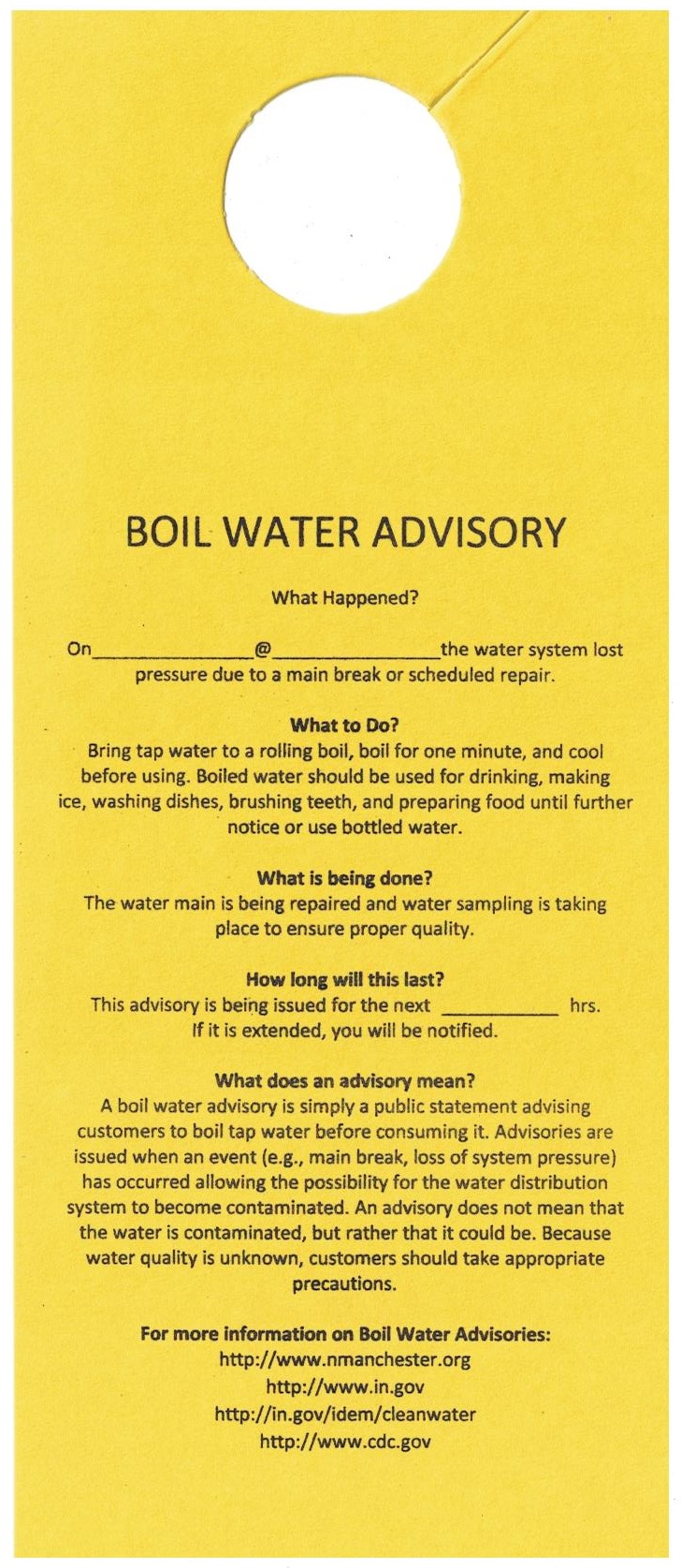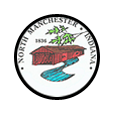Town of North Manchester, Indiana
The official government website for the Town of North Manchester, Indiana
BOIL WATER ADVISORY

Fact Sheet About What to Do During a Boil Water Advisory
Boiling water
To boil water
• Fill a pot with water.
• Heat the water until bubbles come from the bottom of the pot to the top.
• Once the water reaches a rolling boil, let it boil for 1 minute.
• Turn off the heat source and let the water cool.
• Pour the water into a clean container with a cover for storage.
Disinfecting water
If you are unable to boil your water, disinfect it instead.
If tap water is clear:
• Use unscented bleach (bleach that does not have an added scent).
• Add 1/8 teaspoon (8 drops or about 0.75 milliliters) of unscented household liquid bleach to 1 gallon
(16 cups) of water.
• Mix well and wait 30 minutes or more before drinking.
• Store disinfected water in clean container with a cover.
If tap water is cloudy:
• Filter water using clean cloth.
• Use unscented bleach (bleach that does not have an added scent).
• Add 1/4 teaspoon (16 drops or 1.5 milliliters) of unscented household liquid bleach to 1 gallon (16 cups) of water.
• Mix well and wait 30 minutes or more before drinking.
• Store disinfected water in clean container with a cover.
Remember that containers may need to be sanitized before using them to store safe water.
To sanitize containers:
• Use unscented bleach (bleach that does not have an added scent).
• Make a sanitizing solution by mixing 1 teaspoon (5 milliliters) of unscented household liquid bleach in 1 quart (32 ounces, 4 cups, or about 1 liter) of water.
• Pour this sanitizing solution into a clean storage container and shake well, making sure that the solution coats the entire inside of the container.
• Let the clean storage container sit at least 30 seconds, and then pour the solution out of the container.
• Let empty container air dry OR rinse it with clean water that has already been made safe, if available. Never mix bleach with ammonia or other cleaners. Open windows and doors to get fresh air when you use bleach.
Water filters
Boil tap water even if it is filtered. Most kitchen and other household water filters typically do not remove bacteria or viruses.
Preparing and cooking food
• Wash all fruits and vegetables with boiled water that has cooled or bottled water.
• Bring water to a rolling boil for 1 minute before adding food to cook.
• Use boiled water when preparing drinks, such as coffee, tea, and lemonade
• Wash food preparation surfaces with boiled water.
Feeding babies and using formula
• Breastfeeding is best. Continue to breastfeed. If breastfeeding is not an option:
• Use ready-to-use baby formula, if possible.
• Prepare powdered or concentrated baby formula with bottled water. Use boiled water if you do not have bottled water. Disinfect water for baby formula if you cannot boil your water (see above for directions on how to use bleach to disinfect water).
• Wash and sterilize bottles and nipples before use.
• If you cannot sterilize bottles, try to use single-serve, ready-to-feed bottles
Ice
• Do not use ice from ice trays, ice dispensers, or ice makers.
• Throw out all ice made with tap water.
• Make new ice with boiled or bottled water.
Bathing and showering
Be careful not to swallow any water when bathing or showering.
Use caution when bathing babies and young children. Consider giving them a sponge bath to reduce the chance of them swallowing water.
Brushing teeth
Brush teeth with boiled or bottled water. Do not use untreated tap water.
Washing dishes
Household dishwashers generally are safe to use if the water reaches a final rinse temperature of at least 150 degrees or if the dishwasher has a sanitizing cycle.
To wash dishes by hand:
• Wash and rinse the dishes as you normally would using hot water.
• In a separate basin, add 1 teaspoon of unscented household liquid bleach for each gallon of warm water.
• Soak the rinsed dishes in the water for at least one minute.
• Let the dishes air dry completely.
Laundry
It is safe to do laundry as usual.
Pets
Pets can get some of the same diseases as people. It is a good idea to give them boiled water that has been cooled.
For more information, see or contact:
• Personal Preparation and Storage of Safe Water: CDC provides guidance on the amount of water needed for good health, as well how to prepare and store safe water before and during an emergency.
• Hygiene and Handwashing: CDC provides guidance on alternative hygienic practices when water is not available or is contaminated.
• A Guide to Water Filters: CDC maintains a guide for filters that remove Cryptosporidium or Giardia.
• EPA Safe Drinking Water Hotline: 1-800-426-4791
• Consumer Information : EPA provides information and guidance about drinking water quality, emergencies, contaminants, public health issues, and treatment and storage.
Contact Us
Water Supervisor
- Phone: (260) 982-9800
- Fax: (260) 982-1525
- Staff Directory
- Office Hours:
Office Hours:
M-F 8:00 a.m. - 5:00 p.m.
Water Plant Operations:
M-F 7:00 a.m. - 4:00 p.m.
(260) 982-2993
After Hours Emergency Phone:
(260) 982-8555

 Site Design and Content Copyright © 2024
Site Design and Content Copyright © 2024